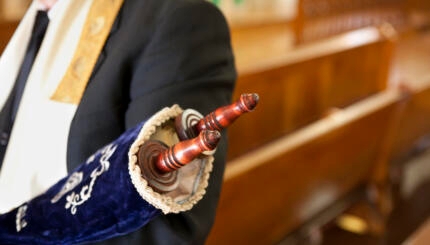Rabbi Kerry Olitzky
Usually we think of small, southern communities as being at least a beat behind their larger counterparts, especially when they have small—even “diminishing”—Jewish populations. Many of these Jewish communities were once thriving, but they have followed the American trend of younger generations abandoning smaller hometowns for larger urban centers.
These communities may be demographically small, but they should be considered ideologically large in their response to those who have intermarried.
How these communities respond should be instructive to other communities, regardless of size or region. It is true that the intermarriage rate—particularly among non-Orthodox Jews—is among the highest in these communities. Even if there is debate among demographers as to the exact rate of intermarriage, what is most important to consider is the trend lines. That’s why the well-practiced response of these communities is so important at a time when the rest of the North American community has finally transcended the question of “Should we reach out to those who have intermarried?” and moved to “How should we reach out to those who have intermarried?”
In a word, the only response of these smaller Southern communities has always been the same:
welcome.
To be the most welcoming of communities is the only response possible and that is what these small communities have been doing. The synagogue remains the most numerous of Jewish communal organizations in the United States. In smaller communities, it is often the only Jewish communal institution and serves a multiplicity of functions. That’s why its actions are so demonstrative.
How have these Southern Jewish communities led the way? While institutions in other parts of the country are still debating the roles for those of other religious backgrounds in synagogues throughout the country, many in the South have long seen “non-Jewish partners” take on key roles in their communities.
As part of Jewish Outreach Institute’s ongoing partnership with the Goldring/Woldenberg Institute of Southern Jewish Life, I traveled to Mississippi this past week to serve as faculty at the ISJL’s education conference. I was reminded, again, of how many individuals in these Southern communities might not be Jewish—but are undoubtedly contributing to the Jewish future.
Simply by committing to raise Jewish children, they are contributing to our future; but their involvement goes above and beyond that. Southern congregations recognize this, voting with their feet and extending full synagogue membership to non-Jewish partners. These unsung heroes have joined the boards of synagogues, sometimes a thankless task, and have even become board presidents in some places. They are religious school teachers, and some have even become the directors of their town’s religious schools.
These partners-of-Jews have cast their lot with the Jewish people. The synagogue has become their spiritual home. We welcome them. We applaud them. And we thank so many in the Southern parts of these United States for leading the way, providing an example for the rest of us to follow.
The Jewish world is full of debates. Get the latest in MyJewishLearning’s weekly blogs newsletter.



